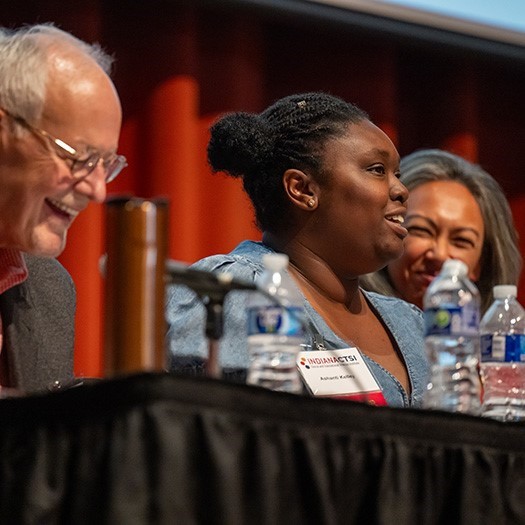Public Deliberation
The Indiana CTSI’s public deliberation project is exploring how community members feel about biobank research. It is led by the Bioethics and Subject Advocacy Program (BSAP) of the Indiana CTSI.
Translating Public Input Into Policy
Public deliberation is a method of engaging community members to identify and implement approaches to increasing trustworthiness in biobanking.
We are learning about what people value; what concerns them; what they don’t understand; and what they think could improve in biobank research.
We believe these findings will have innovative applications for clinical and translational scientists.
Biobank are collections of biological samples. They are a cornerstone of translational research. The samples can be blood, saliva, or solid tissue and can be stored indefinitely, often for decades. Researchers request samples and linked information about the people they came from (“donors”). The samples and information given to researchers are generally de-identified, with all names and other ways of identifying the person they came from removed.
Biobanks depend on the willingness of thousands of people, from diverse ethnic and racial backgrounds, socioeconomic statuses, and geographic regions – a true cross-section of society – to provide their biosamples and health information for broad and unconstrained use. This agreement requires trust, and so biobanks must earn the populations trust and then act in ways that honor that trust.
Public deliberations are used in many areas, from local budgeting to science policy. In a public deliberation, people provide their input on questions about their values and beliefs. The key idea is that the public should be engaged in careful, informed, and nuanced discussions that lead to new policies.
Participants discuss and debate issues, provide justification of views with each other, and generate and vote on recommendations, or “deliberative outputs.”
Analysis of deliberation transcripts can provide important insights and reveal subtleties such as value trade-offs, rejected positions, and implicit values underlying certain positions.
The objective of this research is to develop guidelines that biobanks can adopt to address key questions about data collection, return of results, public-private partnerships, and participant understanding. The outcome of the public deliberation will help other investigators use this method to engage people in translational research.
In Spring 2024, the Indiana CTSI hosted a public deliberation that brought together 24 people from across Indiana for two weekends to consider important questions about how biobanks should run.
This group of people from across the state learned about biobanks from local and national experts, scientists, administrators, and regulators, from universities and the private sector. The deliberants met in small and large groups to discuss topics such as whether and how biobanks should get consent from donors; analyze samples; collect data; partner with for-profit entities; and share biosamples and data for research. The deliberants developed and considered 23 recommendations and strongly supported 15 of them.
Some of the 15 recommendations will be implemented in biobanks in Indiana (and possibly beyond), and donors to biobanks will be asked how they feel about these changes. In this way, the suggestions of normal Hoosiers can guide translational research in Indiana for years to come.
Collaborating Across the Indiana CTSI
In addition to Bioethics & Subject Advocacy Program, several other programs are working together on more public deliberations. Find out how you can get involved with their work.
Related Services & Resources
-
About Us
The Indiana CTSI brings together Indiana’s brightest minds to solve the state’s most pressing health challenges. Learn how.
-
Community Engagement
Connect with community health leaders across the state.
-
Partnerships & Initiatives
See how we’re making an impact across the state.
-
Research Service Cores & Facilities
Explore how the Indiana CTSI can catalyze your research.
-
Monon Collaborative
Building a network of community and academic partners dedicated to creating a healthier future for Indiana.

